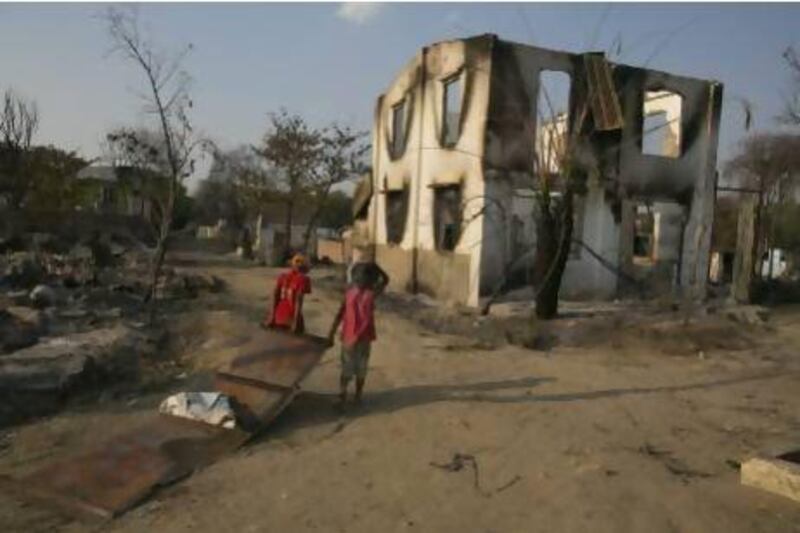WASHINGTON // Few imagined Myanmar would embrace democracy when the United States began its historic engagement with the military regime. The country's rapid changes were lauded by visiting western leaders, and the nation's president was hailed as a hero. But spasms of spreading, sectarian and ethnic violence show that the reform path is bumpier than expected and have taken the sheen off a foreign-policy success of the Obama administration's first term.
While Washington says the country's overall direction is still positive, some experts worry that Myanmar risks backsliding towards the military rule that ended two years ago.
In the past two weeks, violence between Buddhists and Muslims has left dozens dead. Thousands of refugees from an earlier spate of sectarian bloodletting are fleeing on rickety boats. And in a top concern to US policymakers, the country's murky military ties with North Korea continue.
Washington has been at the forefront of international efforts to encourage the country to open up to the world and ease controls on its 60 million people. Thursday marks the anniversary of the historic US announcement that it was normalising diplomatic relations - the first in a series of diplomatic rewards in response to reforms. That culminated in the suspension of economic sanctions and, in November, the first visit to Myanmar by a US president.
The benefits of reforms have been clear. The government of Thein Sein, the president, has released hundreds of political prisoners, eased restrictions on the press and freedom of assembly and brokered ceasefires with most of the nation's ethnic insurgencies. After years of house arrest, the opposition leader Aung San Suu Kyi was elected to parliament, which is performing its role with vigour.
But the rapid pace of change has also been accompanied by chaos, as ugly sectarian tensions have surfaced.
Human-rights groups and a United Nations envoy have criticised the Myanmar government's failure to prevent attacks - mostly on minority Muslims by majority Buddhists. Sectarian and ethnic violence in western Rakhine state last year killed hundreds and drove more than 100,000 Rohingya Muslims from their homes, intensifying long-running persecution of the stateless minority group. In an ominous development, Muslim-Buddhist violence spread in March to central Myanmar, killing dozens more.
The government's emergency response has been slow and some fear the unrest could escalate.
"If the new government and opposition can't fashion an effective response to this violence that brings justice and accountability, then it seems likely the violence will escalate," said Frank Jannuzi, the deputy executive director of Amnesty International USA.
"The risk here is that the military may step in and set back the reform process. That risk is very real."
A senior state department official said the US was gravely concerned about the violence and wanted the government to make a broader effort to stem tensions before they flared up. But he credited Mr Thein for eventually issuing a message of tolerance and respect for religious differences - unprecedented for the past 50 years when sectarian tensions were dealt with through the use of force.
Although there is no national-level organisation of unrest, individuals and groups appear to be inciting the violence, said the official. He did not identify who they might be.
Priscilla Clapp, a former US charge d'affaires in the former capital city of Yangon, visited Myanmar last month. She said the presence of outside provocateurs could be part of a campaign to strengthen the military's hand and keep it involved in maintaining order in the country.
The internal unrest has spawned a refugee crisis that goes beyond Myanmar's borders. Since the outbreak of violence in Rakhine state near Bangladesh last year, an estimated 13,000 Rohingyas have fled by sea, seeking refuge in Thailand, Malaysia, Indonesia and elsewhere. Hundreds have drowned, and in some cases authorities have pushed back refugees from their shores or refused them humanitarian access.
Despite the drumbeat of bad news, the Obama administration remains upbeat about Myanmar, contending that the pace of change has exceeded expectations and that overall progress toward democracy is positive.
Critics, however, question whether, in the rush to reward progress, the US has lost its leverage should Myanmar backtrack.
Walter Lohman, the director of the Asia programme at the conservative Heritage Foundation think tank, said the administration was right to normalise diplomatic relations but had moved too quickly to suspend investment and trade sanctions.
There are unresolved ethnic conflicts, a constitution skewed in favour of the military and political prisoners still in detention. National elections in 2015 are widely viewed as being key to consolidating reforms.
"We won't really know whether the US going so far and so fast on sanctions was the right thing to do for at least a year or so yet," said Mr Lohman, who recommended that the US set benchmarks Myanmar should meet for sanctions to be lifted entirely. "The military could still call this whole thing off if they want to."





